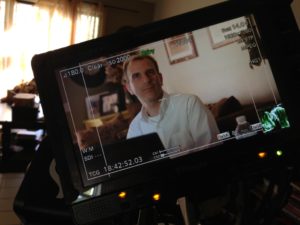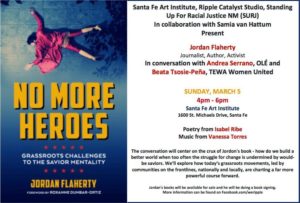Tags
Related Posts
Share This
No More Heroes

Jordan Flaherty is a journalist from New Orleans. Photo provided by Jordan Flaherty.
In 2005, Hurricane Katrina decimated New Orleans and the surrounding areas, resulting in almost 2,000 fatalities. After the carnage, families were separated, 10,000 National Guard troops occupied Louisiana and Jordan Flaherty became a journalist.
Flaherty describes being witness to the tragedies happening at the time in the disaster zone and and to what he considered to be media mistreating and labeling African Americans as thugs and criminals in a way that was dismissive to his community’s ongoing struggle. “I was evacuated out of [New Orleans] in the aftermath of the storm. What I saw changed my life,” Flaherty says.
Flaherty is an American television producer, journalist and the author of Floodlines: Community and Resistance from Katrina to the Jena Six, and most recently, No More Heroes, an exploration of how, in Flaherty’s opinion, marginalized groups can be negatively affected by the good intentions of those with white privilege.
Since the publication, Flaherty has traveled across America in search of artists and activists with whom to collaborate and address connective political and social issues. As a part of his travels, Flaherty will be discussing his book, No More Heroes, at the Santa Fe Art Institute in a collaborative event discussing the efficacy of grassroots movements in making change in America.
Flaherty describes his introduction to journalism happening when an email he had written about Hurricane Katrina had been forwarded around the world, translated into several languages and ultimately published in a variety of publications. After being contacted by several people he greatly respected, Flaherty decided, “Maybe I could be useful, could tell these stories that weren’t being told.”
Flaherty’s books focus on getting to the ‘truth.’ No More Heroes examines accountability for how each person of privilege perpetuates the oppression of certain communities and proposals to correct such behavior. “In those days after the storm,” Flaherty says, “[New Orleans] faced multiple kinds of attacks.” Alongside the terrible natural disaster, the city faced the destruction of public housing by the government, public education staffing turnover a violent and cruel police force and an obsolete healthcare system. Flaherty was inspired by the resistance of the people of New Orleans.
Flaherty had to ask himself, “What does it mean to be a journalist as a white, cisgendered and privileged person?”After multiple discussions with other activists in his position, Flaherty decided to work toward bringing together people of privilege to recognize and address their roles and how they can truly help underprivileged and underrepresented communities.
No More Heroes was published last November, just days after Donald Trump was elected president of the United States, and serves as a reminder for people of privilege to ask themselves difficult questions in a time of widespread xenophobia and white nationalism in America. “Who are you accountable to?” Flaherty asks. “What does that accountability mean?”
This rings particularly true for Flaherty’s Santa Fe audience. With New Mexico home to immigrant workers and indigenous tribes, the sociopolitical climate of the state is at risk when facing systematic racism and xenophobia. The artists of Santa Fe are in the perfect position to start enacting change on the world around them, beginning in their own adobe neighborhood. “There’s satisfaction to being on the side of justice,” Flaherty says. “It’s changed my life.”
The event begins at 4 p.m. After the discussion, Flaherty will be signing books.

Flaherty will be speaking at SFAI, Sunday March 5.






 Jackalope Magazine is the student magazine of Santa Fe University of Art and Design. Building on the interdisciplinary nature of our education, we aim to showcase the talent of our university and character of our city.
Jackalope Magazine is the student magazine of Santa Fe University of Art and Design. Building on the interdisciplinary nature of our education, we aim to showcase the talent of our university and character of our city.
Recent Comments